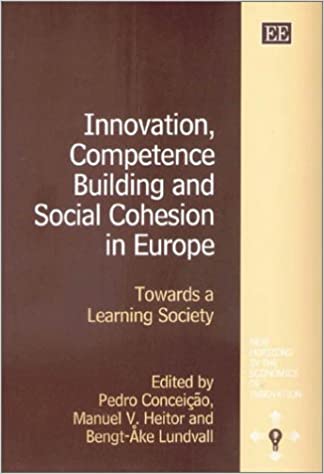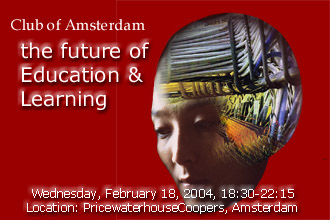
Content
Q&A with Frank Lekanne Deprez

Frank Lekanne Deprez, Director, ZeroSpace Advies
Club of Amsterdam: In your practice you combine working at a university with working as a consultant. If you look 10-15 years ahead, how should universities change to meet the demand of business?
Frank Lekanne Deprez:
Learning in the agricultural economy focused on children between 7 and 14 years of age. Churches and other institutions were the ‘owners’ of the educational process. The amount and type of education was sufficient to last all the years of a working life. During the industrial economy, education was government led, and the age range of the formal student population was between 5 and 22. In the knowledge economy, education / training / learning is almost ubiquitous for all people at all ages. It’s about life broad learning, which refers to “the attitude that learning should not comprise a narrow sector of life, but rather life to its fullest extent” (Larsson, 2000). A job for life is replaced by ‘a life full of jobs”!
Universities in the Knowledge Economy will be doing what they are designed to do: support life broad learning! Looking 10 -15 years ahead, people will probably have Personal Learning Accounts and Learning Portfolio’s. People decide where to go for their formal and non-formal learning challenges and experiences. Do they need just-in-time learning (on-line learning)? The challenge for the universities is to support the knowledge worker – anytime, anyway, anywhere – in his/her cycle of formal and non-formal learning requirements.
Education & learning are prerequisites for a good functioning knowledge economy. What should in particular Small and Medium-sized Enterprises (SME’s : 20 – 250 people ) do to stay competitive in a knowledge economy?
Frank Lekanne Deprez:
Small companies have to increase their learning power to stay alive and kicking. In these type of companies you are either working or you are out of the ‘loop’, taking a course. Today people say, ‘I’m working’, and what they are doing is quickly answering e-mails and voicemails. In SME’s learning must become just that – ‘I’m working’. Formal learning (education) and non-formal learning (work, leisure time) experiences have to be considered as two sides of the same coin. SME’s often fail to integrate new information and knowledge into their ‘memory system’. Their absorptive capacity – the ability to recognize the value of new external knowledge, assimilate it, and apply it to commercial ends – is low.
Currently government controls most educational institutions in Europe. Should government control continue or should education be left to market forces?
Frank Lekanne Deprez:
Formal education will be government – driven (investment in human capital). Non-formal education (workplace/daily life) will increasingly be market – driven (investment in intellectual capital). Once attention is focused on workplace learning and leisure time learning as an important source of knowledge and experience that will drive the innovative capabilities and growth potential of companies, both government and the market place become part of a shared learning community using their resources for common advantage.
About the future of Education & Learning

Incubating ‘Real Time Learning’
by Tom Bentley, Demos, Matthew Horne, Demos & NCSL
Real time learning aims to be a knowledge generating and knowledge sharing set of processes and relationships which can help to meet the context-specific needs of practitioners working in school to school networks and the wider needs of a larger scale national programme aiming to improve attainment outcomes, meet some of the objectives of an ambitious national reform programme, and help to provide policy-makers with lessons about what constitutes effective, capacity-building intervention. The conceptual framework has been built on a synthesis of the principles of collaborative practitioner enquiry, action research and emergent forms of ‘knowledge management’. It is not designed to meet the conventional requirements of large scale academic research, but to be complementary to, and to draw on, the forms of knowledge which such research generates.

Making a European Area of Lifelong Learning a Reality
by EC, Directorate-General for Education and Culture
The Feira European Council in June 2000 asked the Member States, the Council and the Commission, within their areas of competence, to “identify coherent strategies and practical measures with a view to fostering lifelong learning for all”. This mandate confirms lifelong learning as a key element of the strategy, devised at Lisbon, to make Europe the most competitive and dynamic knowledge-based society in the world.
News about the Future
IBM Text-to-Speech Research
“Text-to-speech (TTS) is the generation of synthesized speech from text. Our goal is to make sythesized speech as intelligible, natural and pleasant to listen to as human speech and have it communicate just as meaningfully.
We have developed a novel TTS system, built on IBM’s work in data-driven methodologies for speech recognition. Unlike many others, our system obtains its parameters through completely automated training on a few hours of speech data, which is acquired by recording a specially prepared script. During synthesis very small segments of recorded human speech are concatenated together to produce the synthesized speech.”
ENERGY
Smithsonian Environmental Research Center (SERC)
SERC is dedicated to increasing knowledge of the biological and physical processes that sustain life on earth. SERC’s interdisciplinary research applies long-term studies to examine the ecological questions about landscapes of linked ecosystems, especially those impacted by human activities. SERC scientists use an experimental approach to discover mechanisms regulating the structure and dynamics of the environment.
Several studies focus on the effects of increasing concentrations of atmospheric carbon dioxide (CO2) caused by fossil fuel combustion and forest clearing. Increased CO2 contributes to the “greenhouse effect,” the trapping of heat in the atmosphere. Global warming causes increases in sea level and changes in weather patterns. This threatens destruction of coastal areas, alteration of natural ecosystems, and widespread disruption of agriculture.
Report about ‘the future of the European Knowledge Society’
Report: the future of the European Knowledge Society
The Club of Amsterdam organised a conference about ‘the future of the European Knowledge Society’ on January 28, 2004. This report will give you a brief summary of the topics and the discussion between the panel and the participants of the Club of Amsterdam. The participants of the event filled out a questionnaire; you can find the results in the report.
Centre for the Mind
Paul Scherrer Institute – PSI
General Energy Research Department (ENE)
Research at PSI comprises all aspects of human energy use, with the ultimate goal of promoting development towards a sustainable energy supply system. Technologies are being advanced for the utilization of renewable energy sources, low-loss energy storage, efficient conversion, and low emission energy use. Experimental and model-based assessment of these emissions forms the basis of a comprehensive assessment of economic, ecological and environmental consequences, for both present and future energy supply systems.
Electrochemistry Laboratory (ECL)
The Electrochemistry Laboratory is part of the General Energy Research Department at the Paul Scherrer Institute. It is dedicated to modern aspects of electrochemical energy storage and conversion.
Micro- and Nanostructuring Technology: Nano Imprint Lithography
Nano Imprint Lithography (Hot Embossing Lithography) is a novel technique for the fabrication of nanostructures on large surfaces. The method is based on the excellent replication fidelity obtained with polymers and combines thermo-plastic molding with common pattern transfer methods. Once a solid stamp with a nanorelief on the surface is fabricated it can be used for the replication of many identical surface patterns. It therefore circumvents many limitations of conventional optical lithography.
Center for Radiopharmaceutical Science
Our Vision
To create smart radioactive drugs – radiodiagnostics/therapeutics to target metastatic diseases
To visualize molecular functions of brain and tumors with PET-radioligands
Laboratory for Astrophysics
Our Laboratory is involved in experimental, observational, and theoretical astrophysics, in the building of space harware components, as well as in the development of cryogenic detectors. Major projects developed or being developed include contributions to the XMM-Newton, Hessi, Integral, GWST-MIRI space observatories.
Recommended Book

Innovation, Competence Building and Social Cohesion in Europe: Towards a Learning Society
by Pedro Conceicao (Editor), Manuel V. Heitor (Editor), Bengt-Ake Lundvall (Editor)
It is almost universally accepted that we are moving increasingly towards an information society, where knowledge and learning are the new currency of power. This book seeks to challenge this axiom by looking in more detail at the subtle relationships between knowledge and social development. The editors are at pains to differentiate the process of knowledge creation from the simple accumulation of knowledge.
The original contributions within this book are aimed at capturing new socio-economic trends and finding policy strategies promoting the learning society in Europe through joint efforts and integrated actions on innovation, competence building and social cohesion.
Innovation, Competence Building and Social Cohesion in Europe will be of special interest to researchers and scholars of science and innovation and technical change. Its policy recommendations will ensure that the book will also appeal to social scientists of education policy.
Supporter of the Club of Amsterdam event about ‘the future of Education & Learning’ on Wednesday, February 18, 2004 is:


The Club of Amsterdam Round Table: Jelle Feringa

Jelle Feringa, EZCT, a network dedicated to critical research
Other than globalization another radical societal phenomena is occurring, having equally radically implications on life; the phantomisation of society. Invariably we deal with phantom-systems; those however abstract have radical implications on daily life.
Economy by no doubt is the greatest, most implying of these systems. How global and grotesque this system is, its influence resonates in each of our lives.
A phantom aspect is that when the economy is slow (what is that ‘is slow?’), the cause is most likely far from our empirical perception.
By phantom-system I don’t aim for those systems that are incomprehensible, but those that fall out of empirical reach.
When someone’s credit card is duplicated on the other end of the world, and the account cleaned out, you’re likely to receive another form of empathy, than if you would have been robbed from your physical money. If your library goes up in flames, or if your record collection is stolen, people are much more likely to sympathize with you than when your hard drive cracks up.
The greater part of the infrastructure facilitating these phantom-systems is never disclosed to most persons: from telephony servers to internet backbones, the servers running banks & stock exchanges up to the source code of the system running most home-computers (until this week that is… [click here])
Perhaps the most important societal phantomisation is the lack of causation in the profession one performs, and the reason one survives, nearly a lack of primitivism one might argue. The abstraction allowing this is at the instigation of economy. I wonder if this implies for a cultural norm: does it imply a certain superiority over there where a relation between action and survival can be deduced.
Club of Amsterdam Events 2003/2004
| October 28, 2003 | the future of Food & Biotech |
| November 27, 2003 | the future of the Media & Entertainment Industry |
| January 28, 2004 | the future of the European Knowledge Society |
| February 18, 2004 | the future of Education & Learning |
| March 31, 2004 | the future of Energy – the Hydrogen Economy? |
| April 28, 2004 | the future of Healthcare & Technology |
| May 19, 2004 | the future of Architecture |
| June 23, 2004 | the future of Culture & Religion |







Customer Reviews
Thanks for submitting your comment!